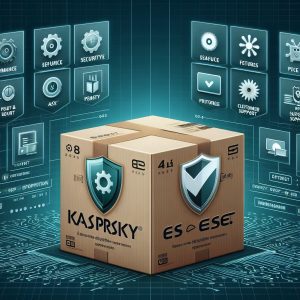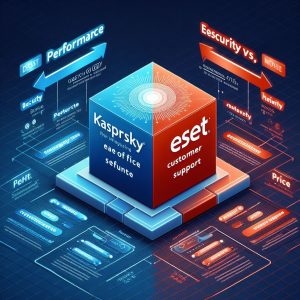Introduction
Kaspersky and ESET are two of the most well-known cybersecurity companies offering antivirus and internet security software for home and business use. Both companies have been operating for over 25 years and have earned strong reputations for their ability to detect and remove malware, viruses, spyware, ransomware, and other cyber threats.
Kaspersky Lab was founded in Russia in 1997 and has grown into an antivirus powerhouse with over 400 million users worldwide. Its flagship consumer products include Kaspersky Internet Security and Kaspersky Anti-Virus, while its small business and enterprise offerings are branded under Kaspersky Small Office Security and Kaspersky Endpoint Security.
ESET was founded in Slovakia in 1992 under the name ESET NOD32, after their first antivirus product. Like Kaspersky, ESET offers separate product lines for consumers and businesses. Its consumer products are labeled ESET NOD32 Antivirus and ESET Internet Security, while ESET Endpoint Protection Advanced and ESET Endpoint Detection and Response target enterprise environments.
Both vendors have been independently tested and verified by AV-Test and AV-Comparatives. They routinely score 100 percent in malware detection tests, meaning they detect all test samples with zero false positives. However, there are some key differences between the two providers in terms of features, performance impact, support, pricing, and controversies.

Comparison of Features
When evaluating Kaspersky vs ESET in a feature by feature comparison, ESET comes out ahead in certain areas like data encryption, privacy protection, and secure file deletion. At the same time, Kaspersky offers a few unique bonuses like ransomware rollback and hardened web browser protection.
Here’s an overview of some of the standout features offered by each antivirus:
ESET Features
- Secure Data Encryption – Use RSA-AES 256 bit encryption to password protect files and encrypt external drives.
- Safer Online Banking – Special protection against keyloggers and screen grabbers when banking online.
- File Shredder – Permanently deletes files so they can’t be recovered.
- UEFI Scanner – Checks the UEFI firmware on your device for malware or rootkits.
- Privacy Tools – Ability to block websites from gathering private data and enforce cookie handling policies.
- Fast Scanning Speed – Optimized to use fewer system resources so scans can be completed quickly.
Kaspersky Features:
- Safe Money Virtual Keyboard – An on-screen keyboard protects against keyloggers capturing passwords, credit cards, etc.
- Ransomware Protection – Real time monitoring detects ransomware behavior and rolls back any file changes to undo damage.
- Exploit Prevention – Proactively blocks malware that tries to use software vulnerabilities to spread.
- Hardened Browser – Isolated browser protects you from infected web pages installing malware or accessing private data.
- Network Attack Blocker – Stops network level attacks like port scans, ping floods, and spoofed traffic.
Based on features alone, ESET holds an edge with its focus on data security, online privacy, and performance efficiency. Kaspersky fights back with novel protections like virtual keyboards, anti-ransomware roll back, and hardened browsers. Both offer well-rounded suites overall that go far beyond basic anti-malware scanning.
Performance Impact
Antivirus software requires significant system resources to actively monitor activity, scan files, and filter web traffic in real time. Poorly optimized antivirus can slow down your PC and interfere with other programs.
When comparing the performance impact between ESET and Kaspersky, independent testing consistently shows ESET having much lower effect on system speed and resource usage.
In AV-Comparatives’ 2022 Performance Test, they evaluated the slowdown caused by 18 leading antivirus products on a standard Windows 10 test system. The average slowdown was 14 percent, but ESET only caused a minor 2.7 percent impact that earned it a Top Product award. By comparison, Kaspersky Internet Security had an 18.8 percent slowdown, which ranks closer to average.
Similar results were observed in AV-Test’s 2022 performance scores for impact on launching popular websites and common applications. On a scale of one to six, ESET earned the maximum 6.0 points in every category, while Kaspersky lagged slightly behind at 5.5 for web browsing and 5.0 for application launch impact.
The superior optimization of ESET is likely thanks to its lighter and less intrusive approach to data collection. Kaspersky gathers more extensive system data and engages in deeper monitoring activities to power some of its unique behavioral-based protections. Unfortunately, these come at a cost to performance.
For those whose priority is minimizing drag on system resources, ESET is easily the best option between the two antivirus vendors. Its efficient design translates to faster scan speeds as well with minimal disruption to your daily workflow.

Customer Support
The quality and availability of customer support should factor into any antivirus buying decision. Both Kaspersky and ESET offer the standard support channels like phone, email, community forums, and live chat. However, there are some clear differences when looking at response times and hours of operation.
Kaspersky Support
Kaspersky consistently ranks among the top antivirus vendors for customer support. Their team is available 24/7 for all USA time zones to provide phone or chat support. You can expect well-informed reps and quick issue resolution. Many problems can be fixed with automated tools as well through their online My Kaspersky portal.
ESET Support
ESET also gets high marks for customer service, although their hours are more limited. Support is available via phone or chat from 8am to 8pm CT in North America. The company relies on an extensive knowledge base and documentation to handle issues outside these hours. Interestingly, ESET also lets you schedule call backs if you don’t want to wait on hold.
When comparing Kaspersky vs ESET on support, Kaspersky has a slight edge with US-based teams and around the clock availability. However, both companies demonstrate a strong commitment to keeping customers satisfied as seen by multiple awards for their service quality. You really can’t go wrong with either option unless you routinely need late night tech support.
Controversies
No cybersecurity vendor is immune from controversy and scandal. However, Kaspersky Lab in particular has faced tougher scrutiny and backlash in recent years due to its Russian roots and alleged ties to Russian intelligence agencies.
In 2017, the US Department of Homeland Security under the Trump administration banned Kaspersky products from federal government systems. They cited national security risks related to Kaspersky’s data collection practises and requirement under Russian law to support government surveillance. Major retailers soon pulled Kaspersky products from their shelves as well.
These actions prompted Kaspersky to launch its Global Transparency Initiative promising more external oversight into its internal security practises, auditing code for backdoors, and relocating data storage to Switzerland. However, the political stigma remains in America.
More recently in 2021, the crowdsourced web security project HackerOne cut ties with Kaspersky citing conflict with US sanctions against Russia. These ongoing controversies continue to impact Kaspersky’s reputation and acceptance compared to competitors like ESET with no such geopolitical baggage.
ESET has managed to avoid any major scandals that call the integrity of its products into doubt. The company remains transparent around data collection and independent audits have found no evidence of secret spying capabilities or covert access built into ESET’s antivirus. This clean track record combined with greater privacy protections makes ESET the less controversial option for many.
Alternatives to Kaspersky Antivirus
Because of continuing concerns over spying and transparency, companies and government institutions in the US often cannot use Kaspersky software even if it offers the best protection. Thankfully, Kaspersky is not the only enterprise-grade endpoint security suite available.
Here are some top-rated Kaspersky alternatives for business use:
ESET Endpoint Protection Advanced
Already covered extensively, ESET offers one of the most feature-complete and high performing options for securing business endpoints across operating systems.
Trellix Endpoint Security
Born out of McAfee and FireEye, Trellix combines anti-malware with AI-powered threat detection and response. Also includes endpoint detection and response (EDR), DLP, and security orchestration.
Bitdefender GravityZone Elite
Bitdefender is another seasoned cybersecurity vendor offering multilayered defenses and centralized management for hybrid enterprise environments. Has specific ransomware countermeasures.
Microsoft Defender for Endpoint
The built-in Microsoft solution leverages threat intelligence from Microsoft 365 Defender to coordinate protection and response across operating systems and SaaS applications.
SentinelOne Singularity Platform
An emerging leader in EDR and endpoint protection platforms (EPP), SentinelOne uses machine learning for behavioral analysis to block sophisticated threats.
These alternatives match or exceed Kaspersky’s malware detection rates without restrictions on use. They provide full visibility and control over your environment to stop threats. Most integrate well with existing Microsoft and security stacks too.

Conclusion
In head-to-head competition between the two antivirus giants, ESET emerges on top against Kaspersky in a number of key areas that matter most to consumers and IT security teams.
ESET consumes fewer system resources for less impact on PC performance compared to Kaspersky. It also includes extra privacy tools, secure encryption capabilities, and permanent file deletion utilities that Kaspersky lacks.
More importantly, ESET avoids controversy about product integrity or trust, whereas Kaspersky still battles fallout from alleged Kremlin ties that makes deployment a non-starter for some organizations.
While both companies offer reliable malware scanning and complementary protection features not covered here, ESET solutions are generally lighter, faster, and inspire greater confidence overall thanks to their focus on customer privacy and transparency.
Unless you specifically need capabilities like ransomware rollback offered uniquely by Kaspersky, ESET products make a safer choice for personalized data security and online protection with minimal hassle or headaches.